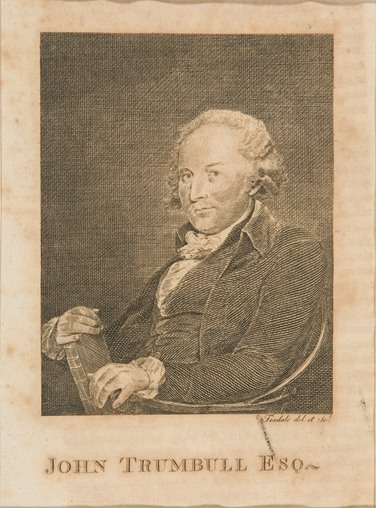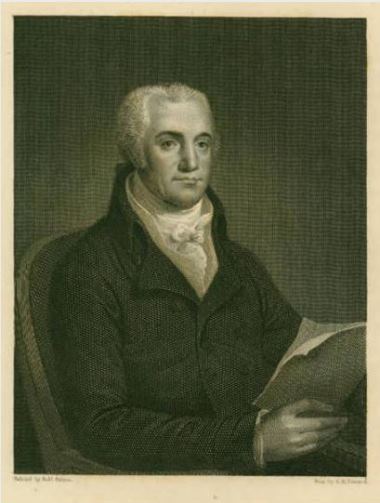by Andy Piascik
Poets are sometimes as important in telling the story of a nation as historians. This is especially true of poets and painters who come of age during the revolution that births a nation. Such was the case with the Hartford Wits—a talented group of writers greatly influenced by the struggle of the American colonies for independence from Britain.
The Origins of the Hartford Wits
John Trumbull was the oldest of the Wits. Born in what is now Watertown, Connecticut, in 1750, Trumbull was such an advanced student that he passed an entrance examination to Yale University at the age of seven and enrolled at the school at 13. Two years later, Timothy Dwight, enrolled at Yale. Like Trumbull, Dwight, a Massachusetts native, was a child prodigy who was also just 13 when he matriculated. The two soon befriended Derby native David Humphreys and Dartmouth transfer Joel Barlow, born in Redding in 1754.
As the four men who eventually became the Wits graduated, they remained at Yale tutoring, teaching, and expanding their circle of literary aspirants. They had all begun writing poetry by the early 1770s and it was Trumbull who initially gave voice to the themes that defined the group, first in “An Essay on the Use and Advantages of Fine Arts” and then in “The Progress of Dulness,” a long poem that satirized college education. Trumbull wrote his “Essay” five years before the battles of Lexington and Concord, yet he already spoke of the colonies as a great nation embarked on a valiant struggle for freedom characterized by heroic acts. He foresaw the emergence of an American literary tradition capable of rivaling the great civilizations of the past.
“The Progress of Dulness,” meanwhile, established a tone and style that later defined the poetry of the Wits: satire, understated humor, and puncturing the pretenses of the self-important and powerful. Trumbull also exhibited a belief in egalitarianism that eventually became a Wit hallmark in, for example, poems that called for the abolition of slavery and full education rights for women. The latter theme is already on display in “The Progress of Dulness” in the characterization of Harriet Simper, who is told to prioritize clothes, appearance, and finding a husband despite obvious intellectual abilities.
Poetry Tells the Story of the American Revolution
With the onset of the Revolutionary War, the Wits turned their sights on new targets, including the colonial government, King George III, and, most notably, colonial residents with loyalties to the British crown. They were hardly armchair dilettantes content to satirize from the comforts of academia, however, as Humphreys and Barlow joined the Continental army and Dwight, who in addition to writing poetry, became a minister, serving as chaplain to the Connecticut Continental Brigade. Among his contributions, Dwight wrote a number of songs for the soldiers of the Revolution, including “Columbia” (Columbia, Columbia, to glory rise/The queen of the world, and the child of the skies!).

John Trumbull Esq., 1801 – By Elkanah Tisdale, Yale University Art Gallery, Mabel Brady Garvan Collection. Used through Public Domain.
Though Trumbull was the only one of the Wit core who did not join the Continental army, he made a contribution with “M’Fingal,” a poem that mocked the British cause through the story of a Loyalist named Squire M’Fingal. Humphreys, meanwhile, rose to the rank of colonel and published “Address to the Armies of the United States of America” and other patriotic poems. After the British suffered their final major defeat of the war, it was Humphreys who presented British General Cornwallis’s flag to the Continental Congress.
After the war’s end, Trumbull, Barlow, and Humphreys settled in the city that bears the group’s name, eventually being joined in Hartford by Lemuel Hopkins, a physician and poet born in Waterbury in 1750, and Richard Alsop, a poet born in Middletown in 1761. Hopkins and Alsop rounded out the Wits, writing poems of their own and collaborating on others, including on “The Anarchiad,” an epic poem that may be the best-known work by the Wits.
The Wits went on to distinguish themselves in other fields. Barlow became a diplomat, Humphreys a historian and politician, and Dwight became a teacher while continuing his work as a minister. Through these endeavors and their poems, they created a lasting impression of colonial America and the American Revolution.
Bridgeport native Andy Piascik is an award-winning author who has written form many publications and websites over the last four decades. He is also the author of two books.









